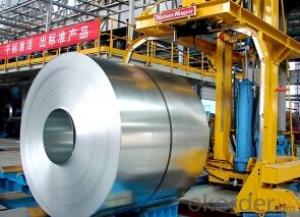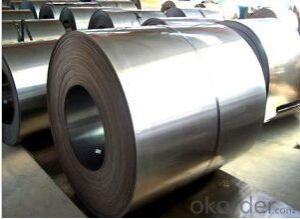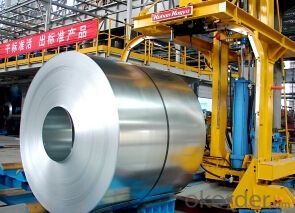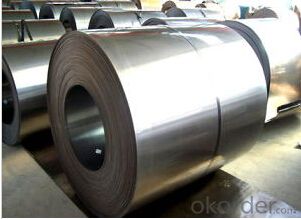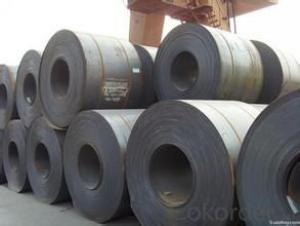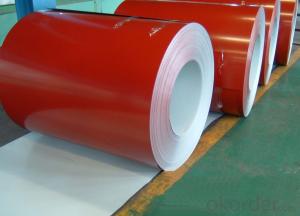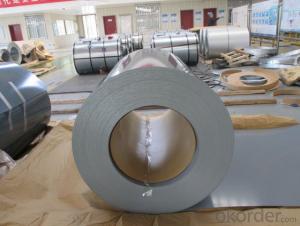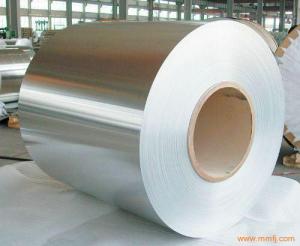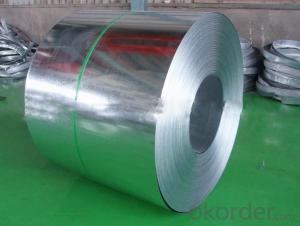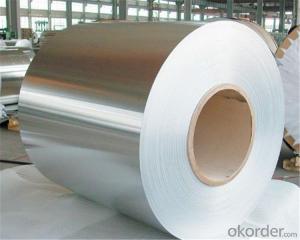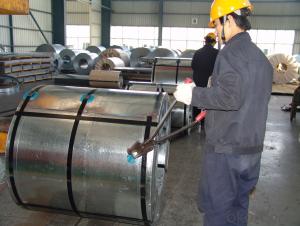3302 Cold Rolled Hot Dipped Galvanized Iron Steel Coil
- Loading Port:
- Tianjin
- Payment Terms:
- TT OR LC
- Min Order Qty:
- 25 m.t.
- Supply Capability:
- 20000 m.t./month
OKorder Service Pledge
OKorder Financial Service
You Might Also Like
Description:
Model NO.:MLK-2015032339
Surface Treatment:Coated
Certification:ISO, SGS, BV, RoHS, IBR
Technique:Cold Rolled
Standard:ASTM, JIS, GB, AISI, DIN, BS
Application:Construction Material
Edge:Mill
Stock:Stock
Steel Grade:Dx51d, SGCC, Sgch, A653, Dx52D, Dx53D
Place of Origin: China
Width:700mm-1250mm
Thickness:0.13mm-0.8mm
Length:Customered
Delivery Time:15-30 Days
Zinc Coating:30-275G/M2
Top Color Coating:10-25
Bottom Color Coating:7-10
ID:508mm
Export Markets:South America, Eastern Europe, Southeast Asia, Africa, Oceania, Mid East, Eastern Asia
Additional Info.
Trademark:MALIKE OR OEM
Packing:Standard Seaworthy, Export Packing
Standard:AISI, ASTM, BS, DIN, GB, JIS
Origin:China
HS Code:7210700000
Production Capacity:700mt/Day
Product Description
JISG 3302 cold rolled hot dipped galvanized iron steel coil
Product Description
Hot-Dip Galvanizing is a protection method for steel workpieces against atmospheric corrosion and widely used in metal structure facilities. Galvanized steel coils are made of full hard steel coils through UEC hot dip galvanizing process. After pretreatment and annealing treatment, the dedusted steel material are submerged into melted zinc solution which is about 500°C hot to attach zinc coating on the steel material as corrosion protection. Then after finishing and pulling-straightening treatment, the galvanized steel coils or sheets are finally completed.
NAME | GALVANIZED | GALVALUME/ALUZINC | PPGI/PPGL |
| MODEL NO. | (0.13-1.2)mm*(600-1250)mm | ||
| TYPE | steel coil, steel sheets/ plates, corrugated steel sheets/plates | ||
| TECHNIQUE | Hot rolled-cold rolled-galvanized | hot rolled-coldrolled-galvalume /Aluzinc | Hot rolled-cold rolled--galvalume/galvanized - PPGL/PPGI |
| SURFACE TREATMENT | Mini/regular/ big/zero spangle, ,Chromate treatment/ chromate-free treatment/ untreated Unoile/ oiled ,TENSION LEVELLERT SKIN PASS anti-fingerprint/Un-anti-fingerprint, coating | Polyester(PE),Silicone Modified(SMP),Acrylic (AC), Polyurethane(PU)PVC Plastisol(PVC plastisol can be embossed to versatile texture)etc | |
| APPLICATION | Guardrails, ventilation ducts, gutters and down spouts, Pre-paint and post paint applications, gutters and down spouts, ceiling suspension bars, shutter door rails. Auto parts, electrical appliances, refrigerator appliances, signs, automotive parts,vending machines, washing machines, showcases and other structural use, roofing, commercial use | Gutters, auto parts, electrical appliances, vending machines, refrigerators, ovens, for pre-paint. structural use, roofing, commercial use etc | Electrical appliances, roofing, partitions. Factory buildings, elevator panelsetc Special applications: wear resistant steel, high-strength-steel plate |
Production Process:
Caustic Washing-Electrolytic Cleaning-Washing-Drying -Annealing-Rack Plating-Cooling-Finishing-Straightening-Chromating-Washing -Polishing-Rolling Up
Prepainted corrugated galvanized steel roofing sheet
1.Application: Roof and wall panel
2.Material:Galvanized steel sheet,Galvalume steel sheet, Prepainted steel sheet
3.Thickness :0.13-0.8mm tolerance:+/-0.01
4.Wave hight:16~18mm,wave pitch:76-78mm ,8-12 wave
5.Ware :Raw material 762mm to 665mm(after corrugated)
6.11 ware:Raw material 914mm to 800mm(after corrugated)
7.12 ware:Raw material 1000mm to 890mm or 900mm(after corrugated)
Packaging & Shipping
Standard packing to export 4 eye bands and 3 circumferential bands in steel, galvanized metal fluted rings on inner and outer edges, galvanized metal & waterproof paper wall protection disk, galvanized metal & waterproof paper around circumfer.
Each bare coil to be securely tied with two bands through the eye of coil (or not) and one circumferential, the contact points of these bands on the coil edge to be protect with edge protectors. Coil then to be properly wrapped with water proof /resistant paper, it then to be properly and completely metal wrapped. And each packed coil to be properly wrapped with band, three-six such band through the eye of coil at about equal distance, and two-four such bands securely tied around belly of coil at about equal distance.
FAQ
1.What's your MOQ?
25MT, it is for one container.
2.Do you have QC teams?
Yeah, sure, our QC team is very important, they will keep the quality control for our products.
3. What's your normal delivery time?
Our delivery time about 10-20days for standard sizes, if you have other requirements like hardness and width ,it is about 20-40days. But don't worry ,we also try our best for the delivery time ,because time longer and our cost is higher.
4.Are the products tested before shipping?
Yes, all of our PPGI and GI was qualified before shipping. We test every batch every day
- Q: What is the role of steel coils in the oil and gas industry?
- The oil and gas industry heavily relies on steel coils, which have a crucial role to play. These coils are primarily utilized for the transportation and storage of oil and gas products. Typically, they are crafted from high-quality steel and designed to endure the harsh conditions encountered during the extraction, processing, and distribution of oil and gas. One of the key functions of steel coils in this industry is to serve as containers for transportation purposes. Oil and gas are frequently transported over long distances, either through pipelines or tankers. Steel coils are used in the construction of these pipelines and storage tanks, providing a robust and secure means of transporting these valuable resources. The strength of steel ensures that the pipelines and storage facilities can withstand the pressure and temperature fluctuations that occur during transportation. Steel coils also play an essential role in the production of drilling equipment. The drilling process involves extracting oil and gas from deep underground reservoirs. Steel coils are employed in the manufacturing of various components of drilling rigs, including pipes, casings, and wellheads. These components must be capable of withstanding the high pressures and temperatures encountered during drilling operations. Steel coils offer the necessary strength and durability to ensure the reliability and safety of drilling equipment. Additionally, steel coils are utilized in the construction of offshore platforms, which are bases for drilling operations in offshore oilfields. The severe marine environment, characterized by saltwater exposure and strong winds, demands materials that can resist corrosion and provide structural integrity. Steel coils are used to fabricate the structural components of these offshore platforms, ensuring their ability to withstand the challenging offshore conditions. In conclusion, steel coils are indispensable in the oil and gas industry. They are employed for the transportation and storage of oil and gas products, the construction of pipelines and storage tanks, the manufacturing of drilling equipment, and the fabrication of offshore platforms. The strength, durability, and resistance to harsh conditions make steel coils an essential material in this industry.
- Q: I want to design and fab a steel helmet like that in the latest Batman cartoon movie. Only problem I can foresee is staining the metal red.
- How To Stain Steel
- Q: How are steel coils used in the production of agricultural structures?
- Due to their exceptional strength and durability, steel coils find extensive use in the production of agricultural structures. These coils, typically composed of high-quality steel, have various applications within the agricultural industry. One major application of steel coils in agricultural structures involves the construction of buildings and storage facilities. By using steel coils, farmers can create robust frameworks that support the walls and roofs of these structures. The inherent strength of steel allows for the construction of spacious areas without the need for excessive support columns, providing farmers with ample storage space for their crops, machinery, and livestock. Furthermore, steel coils play a crucial role in the manufacturing of agricultural equipment and machinery. Whether it be tractors, plows, harvesters, or irrigation systems, steel coils are essential in the fabrication of these tools. The high tensile strength of steel ensures that these agricultural machines can endure the rigorous conditions of farming, including heavy loads, rough terrains, and exposure to harsh weather elements. Moreover, steel coils are also indispensable in the production of fencing and enclosures for agricultural purposes. Whether it's safeguarding crops from animals or establishing boundaries for livestock, steel coils are a vital component in constructing robust and reliable fences. The strength of steel guarantees that these fences can withstand the pressure from animals, preventing them from breaking through and causing harm to the crops or escaping. In conclusion, steel coils are a vital component in the production of agricultural structures and equipment. Their strength, durability, and versatility make them an ideal material for constructing buildings, manufacturing machinery, and creating fences in the agricultural industry.
- Q: What are the common size limitations for steel coil production?
- The common size limitations for steel coil production depend on various factors such as the type of steel, manufacturing equipment, and transportation constraints. However, generally speaking, steel coils are typically produced within a range of widths between 600mm to 2,000mm, with thicknesses ranging from 0.2mm to 25mm. The maximum weight of a steel coil is usually around 25 metric tons, although this can vary depending on the specific production facility and transportation capabilities.
- Q: What are the main applications of steel coils?
- The main applications of steel coils include manufacturing of automobiles, construction materials, appliances, machinery, and various industrial sectors. They are also used in the production of pipes, tubes, roofing, and packaging materials.
- Q: How are steel coils processed for heat treatment?
- Steel coils are processed for heat treatment by first being cleaned and prepped for the treatment. They are then heated to a specific temperature and held at that temperature for a set period of time to achieve desired properties such as improved hardness or ductility. After heat treatment, the coils are slowly cooled down to room temperature to prevent any distortion or cracking.
- Q: What are the dimensions of steel coils used in the railway equipment industry?
- The dimensions of steel coils used in the railway equipment industry can vary depending on the specific application and requirements. However, some common dimensions for steel coils used in this industry are typically around 3 to 5 feet in width and 10 to 15 feet in length. The thickness of the steel coils can vary as well, ranging from 0.01 to 0.5 inches. It is important to note that these dimensions are not fixed and may vary based on the specific needs of the railway equipment industry, such as the type of equipment being manufactured or the specific function of the steel coils.
- Q: A roll of 1 meters wide color steel roll about how many tons?
- Generally speaking, it will be about 4 tons, the export may be larger, but 10 tons of papers have not yet seen
- Q: Can steel coils be coated with abrasion-resistant materials?
- Yes, steel coils can be coated with abrasion-resistant materials. These materials are specifically designed to provide a protective layer against wear and tear caused by friction, impact, or other forms of abrasion. Coating steel coils with abrasion-resistant materials helps to enhance their lifespan and durability, making them suitable for various applications that involve high levels of abrasion or mechanical stress.
- Q: What are the common sizes of steel coils?
- The common sizes of steel coils vary depending on the specific needs and requirements of different industries. However, there are some standard sizes that are commonly used in the steel manufacturing and processing sectors. These include: 1. Slit Coils: Slit coils are typically smaller in size and are commonly available in widths ranging from 0.5 inches to 72 inches. The weight of slit coils varies, but it is usually between 1000 pounds to 50,000 pounds. 2. Master Coils: Master coils are larger in size and are typically used in steel processing facilities to produce various steel products. The width of master coils usually ranges from 36 inches to 96 inches, while the weight may vary from 5,000 pounds to 60,000 pounds. 3. Sheet Coils: Sheet coils are often used in construction, automotive, and appliance manufacturing industries. The standard sizes for sheet coils vary, but they are commonly available in widths of 48 inches, 60 inches, and 72 inches, with lengths ranging from 96 inches to 240 inches. 4. Plate Coils: Plate coils are primarily used in heavy-duty applications such as shipbuilding, bridge construction, and pressure vessel manufacturing. The sizes of plate coils are typically larger, with widths ranging from 36 inches to 96 inches, and lengths varying from 96 inches to 480 inches. It is important to note that these sizes are not fixed and can be customized based on specific customer requirements. Steel manufacturers and suppliers often have the capability to produce coils in various sizes to meet the diverse needs of their clients.
Send your message to us
3302 Cold Rolled Hot Dipped Galvanized Iron Steel Coil
- Loading Port:
- Tianjin
- Payment Terms:
- TT OR LC
- Min Order Qty:
- 25 m.t.
- Supply Capability:
- 20000 m.t./month
OKorder Service Pledge
OKorder Financial Service
Similar products
Hot products
Hot Searches
Related keywords
